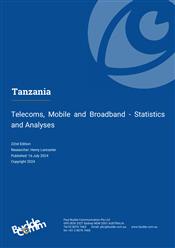Tanzania Telecoms Market Report
Telecoms, Mobile and Broadband - Statistics and Analyses

Digital Tanzania project gets underway as the MNOs make use of additional released spectrum
Tanzania’s mobile market enjoys effective competition, though the fixed-line sector remains largely controlled by the incumbent telco TTCL, which has struggled to gain subscribers. The company came under renewed government scrutiny in early 2023, which stimulated further investment in network infrastructure and upgrades.
The government has encouraged foreign participation to promote economic growth and social development, and policy reforms have led to the country having one of the most liberal telecom sectors in Africa. The government has also sought to increase broadband penetration by a range of measures, including the reduction in VAT charged on the sale of smartphones and other devices, and reductions in the cost of data. Public opposition to a controversial tax on m-money transactions forced the government in mid-2022 to reduce charges.
The MNOs became the leading ISPs following the launch of mobile broadband services based on 3G and LTE technologies. Services based on 5G were launched in mid-2022 by Tigo and Vodacom as these operators hoped to generate revenue growth in the mobile data services market, given that the voice market is almost entirely prepaid, and voice ARPU continues to fall. The MNOs have collectively invested in network upgrades, which in turn has supported mobile data use, as well as in m-money transfer services and m-banking services. Together, these have become a fast-developing source of revenue. In addition, the MNOs have undertaken commitments to build towers aimed at serving areas of the country which lack connectivity as part of a wider national broadband program.
The landing of the first international submarine cables in the country some years ago revolutionised the telecom market, which up to that point had entirely depended on expensive satellite connections. Liquid Intelligent Technologies recently completed a terrestrial cable network linking the East and West coasts of Africa, with an important terminus at Dar es Salaam linking to three submarine cables. In parallel, the government aims to complete a national fibre backbone network, having signed an agreement by which the incumbent telco TTC can make use of the infrastructure of the national electric supply company Tanesco, and so extend broadband availability to 94% of the country.
The government continues to invest in the national backbone network, aiming to have 15,000km in service by the end of 2023, and to provide ongoing connectivity to more countries in the region.
Domestically, Vodacom Tanzania contracted Eutelsat to provide satellite broadband services to areas of Tanzania which lack connectivity, while Starlink has also applied for a license to deliver satellite broadband.
Key developments
- Tanzania and DRC agree to share telecom infrastructure in a bid to improve investment and develop economic opportunities.
- Vodacom extends the reach of its M-mama health service in Tanzania and neighbouring countries.
- Government reviews TTCL’s business viability following a poor performance.
- Tigo Tanzania launches 5G services with Ericsson as vendor.
- Digital Tanzania project gets underway, potentially delivering mobile data service to 8.5 million people in underserved areas.
- TTCL contracts Huawei to build an additional 1,520km to the national backbone network, connecting a further 23 districts.
- Regulator concludes multi-spectrum auction, raising $187.5 million.
- Starlink applies for a license to operate satellite broadband services.
- Report update includes regulator’s market data to March 2023, operator data to Q1 2023, updated Telecom Maturity Index charts and analyses, recent market developments.
Companies mentioned in this report
Tanzania Telecommunications Corporation (TTC), Zanzibar Telecommunications Corporation (Zantel), Vodacom Tanzania; Bharti Airtel (Zain), Millicom (Tigo), Benson Informatics (BOL), Sasatel (Dovetel), Africa Online, Raha.com, Tele2, Alink, SatCom Networks, SimbaNet, Afsat, Cats-Net
Related Reports
- Africa - Fixed Broadband Market - Statistics and Analyses
- Africa - Mobile Infrastructure and Mobile Broadband
- Africa - Mobile Network Operators and MVNOs
- Nigeria - Telecoms, Mobile and Broadband - Statistics and Analyses
- Libya - Telecoms, Mobile and Broadband - Statistics and Analyses
- Sudan - Telecoms, Mobile and Broadband - Statistics and Analyses
- Senegal - Telecoms, Mobile and Broadband - Statistics and Analyses
- Liberia - Telecoms, Mobile and Broadband - Statistics and Analyses
- Eswatini (Swaziland) - Telecoms, Mobile and Broadband - Statistics and Analyses
- Democratic Republic of Congo - Telecoms, Mobile and Broadband - Statistics and Analyses
Share this Report
TMT Intelligence
A platform to scale your intelligence tasks
Monitor critical insights with our AI-powered Market Intelligence Platform gathering and analyzing intelligence in real time. With AI trained to spot emerging trends and detect new strategic opportunities, our clients use TMT Intelligence to accelerate their growth.
If you want to know more about it, please see:
Research Methodology
BuddeComm's strategic business reports contain a combination of both primary and secondary research statistics, analyses written by our senior analysts supported by a network of experts, industry contacts and researchers from around the world as well as our own scenario forecasts.
For more details, please see:
More than 4,000 customers from 140 countries utilise BuddeComm Research
Are you interested in BuddeComm's Custom Research Service?
Hot Topics
News & Views
Have the latest telecommunications industry news delivered to your inbox by subscribing to BuddeComm's weekly newsletter.